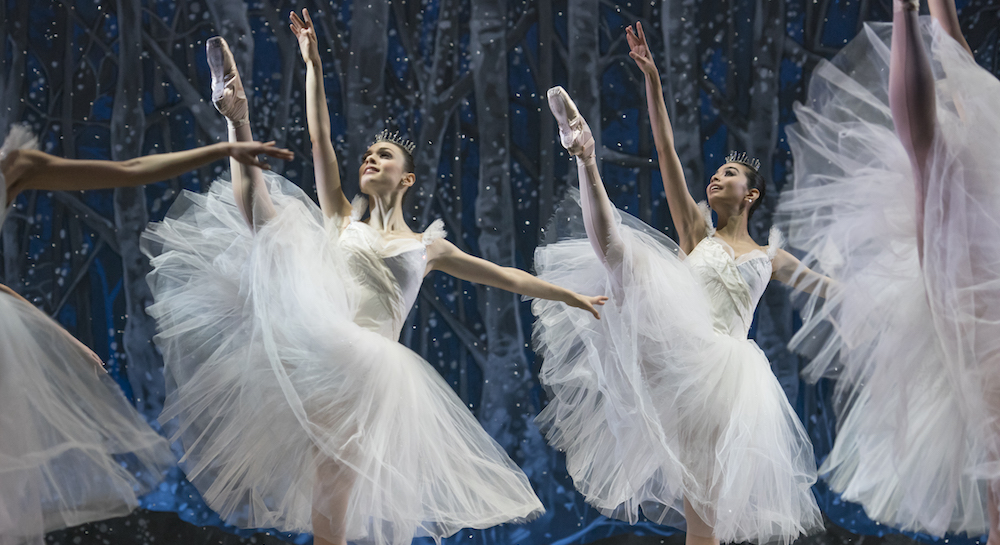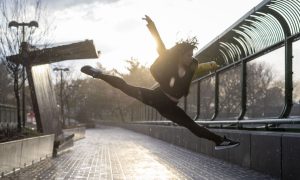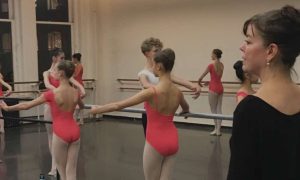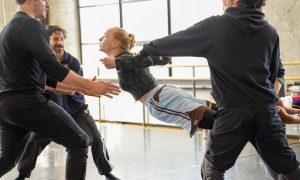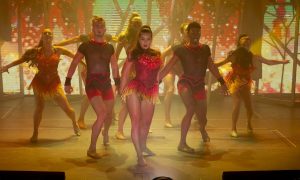The holiday season has arrived, and for many of us, the first thought beyond travel plans or vacation is often presents or gifts. Perhaps we want a new pair of tap shoes, the latest athleisure warm-ups or a new iPod to store our music collection. But what if this season, we gave ourselves the gift greatest gift of all? PRESENCE.
For some insight, we asked professionals how they keep present while performing or keeping up with the demands that come with their career.
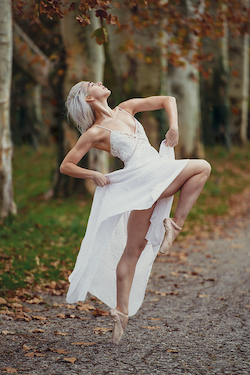
Adrienne Canterna. Photo by Jason Lavengood.
Adrienne Canterna, dancer/director/choreographer from Bad Boys of Ballet
“For most roles, it’s imperative to be present in the moment. To be able to react genuinely to the music, movement and your colleagues is such a beautiful thing. So many dancers anticipate the music or movement or live in their head. Being present empowers your movement and mindset. I think I stay present by praying/meditating daily. I’m grateful for my surroundings and always strive to work hard. Being present allows me to accept gratitude, which then allows me to fully appreciate how beautiful it is to dance every day.“
Audrey Albert King, dance/movement therapist

Audrey Albert King.
“Presence allows me to tap into my immediate bodily experience and to be keenly aware of the environment. I am grounded, open, and able to connect with a client in any way they are able to show up. It is my experience as a dance/movement therapist that when I am feeling present in my body the client can often sense this and the therapeutic relationship deepens. As a dancer/performer when I am present I feel hyperaware and attuned. I am aware of the sensations in my body, my immediate space on stage, other dancers, smells and the audience. I feel like I am on a journey and taking people with me.”
Andres Garcia, artist, Boston Ballet
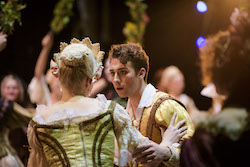
Dawn Atkins and Andres Garcia in Marius Petipa’s ‘The Sleeping Beauty’. Photo by Liza Voll, courtesy of Boston Ballet.
“Being present is a huge part of being a professional dancer. Being present in rehearsals allows me to pick up choreography and retain details effectively during the rehearsal and choreographic process. Presence on stage draws the audience in and allows me to fully appreciate and live in the fleeting moments we as dancers experience when we perform. One thing I have learned throughout my career is that being present, especially on stage, is a way to make the performance more enjoyable for myself. Adopting a present mindset has changed the way I approach class, rehearsal and performances, and has breathed new life and energy into my work. Professional dancing is a relatively short career, even at its maximums, and being present and enjoying every moment of the experience has opened my eyes to how lucky I am to be a part of something so beautiful, transformative and evanescent. Being present on stage is to enjoy and capture a unique experience as it happens, which allows me to reflect on the amazing accomplishments that I have been lucky enough to experience in my career.”
Jody Wager, dance/movement therapist
“Presence helps me to establish and maintain boundaries, which helps to create safety and trust, which allows for connection, which helps folks to open up and share of themselves with others.”
Christina Lynch Markham, Paul Taylor Dance Company member

Paul Taylor Dance Company’s Christina Lynch Markham and Sean Mahoney in ‘Aureole’. Photo by Whitney Browne.
“It is absolutely vital for a dancer to be present in all of Mr. Taylor‘s masterworks. As Taylor dancers, we must be 100 percent present for every single moment when we rehearse and perform. Being in the moment allows my true self to be revealed to my fellow dancers, as well as to the audience, and it’s a wonderful moment because I can leave all of life’s stress behind for a brief moment and, in that time, be completely weightless. I truly believe being present during a performance is the greatest gratitude that a dancer can give an audience member.”
Abigail Merlis, artist, Boston Ballet
“Being present plays an important role in being a successful professional dancer both on stage and off. While performing, being present is striking a balance between being focused and aware. Being present is no easy task; I think everyone struggles to focus on what is important and not to let the unimportant cloud your mind. Everyone has different ways to achieve it, but I think being present plays an important role in a dancer’s career and overall well-being.”
Jennifer Giulianotti, founder and therapist at Balanced Life Movement
“Presence is the connection we have to our body and emotions. As a dancer, presence conveys the essence of the movement (emotion) and shares this with the audience. As a dance therapist, I utilize presence in a similar way to access my own sensations and feelings as they arise and to have empathy with the client. Without it, meaning and true connection can be missed.”
Rachel Cossar, founder of Choreography for Business, LLC.

Rachel Cossar.
“When I was dancing, I noticed that if I imbued my work with intention, I attained a greater feeling and execution of presence. Every detail of a movement or a posture meant something to me, and if I could hold on to a compelling narrative, not only was I more present, but my audience’s attention remained intact in the moment. Now that I am retired from my professional career as a ballet dancer, I use this concept to help my clients achieve a greater sense of presence for themselves. The true magic of presence is that you are able to access a higher executive order when it comes to making decisions and choices. Being intentional about the way you move your body, whether you are a dancer, a sales person, a teacher or a scientist, is a big part of what determines your highest potential and success.”
Amy Cuddy, author of Presence: Bringing Your Boldest Self to Your Biggest Challenges, wrote, “Presence emerges when we feel personally powerful, which allows us to be acutely attuned to our most sincere selves.” Dance Informa wishes everyone the gift of finding your most sincere self. Focusing on presence in 2019 may not only enhance your performance ability but may be just the trick to finding happiness, purpose and satisfaction in dance and life.
Happy holidays!
 By Erica Hornthal, LCPC, BC-DMT, Dance/Movement Therapist, Chicago Dance Therapy.
By Erica Hornthal, LCPC, BC-DMT, Dance/Movement Therapist, Chicago Dance Therapy.
Erica Hornthal is a licensed professional clinical counselor and board certified dance/movement therapist based in Chicago, IL. She received her MA in Dance/Movement Therapy and Counseling from Columbia College Chicago and her BS in Psychology from the University of Illinois Champaign-Urbana. Erica is the founder and CEO of Chicago Dance Therapy, the premier dance therapy and counseling practice in Chicago, IL. As a body-centered psychotherapist, Erica assists clients of all ages and abilities in harnessing the power of the mind-body connection to create greater awareness and understanding of emotional and mental health. For more, visit www.chicagodancetherapy.com.


